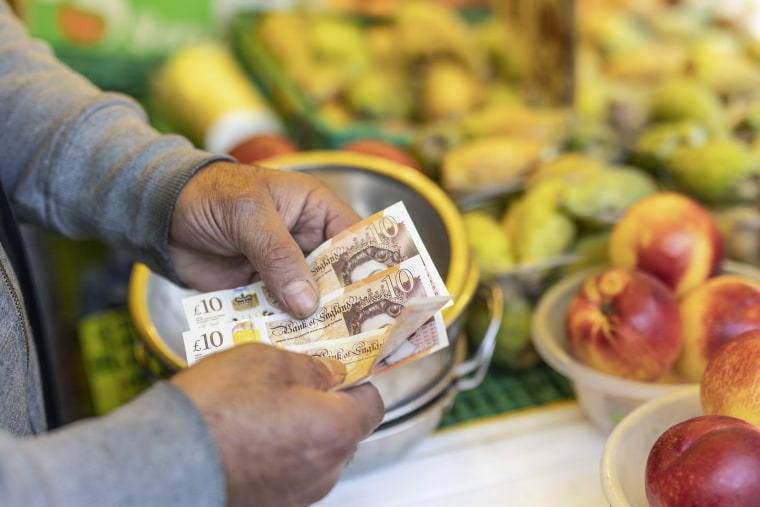The British pound plunged to a record low against the U.S. dollar Monday.
It happened after the British government announced it would cut taxes and invest in industry in order to boost growth.
The pound, historically one of the strongest currencies in the world, fell to as low as $1.04 before bouncing back to approximately $1.07. For most of the past few decades, the pound averaged a price of about $1.50 against the dollar.
While a falling pound will be good for British exporters, traders are betting that the budget, unveiled by the new prime minster, Liz Truss, will lead to higher inflation — and have sent the value of the the country's currency plummeting in response.
Britons were already feeling the impact of the pound's decline before its most recent move. British drivers are now paying $5.45 more on average — equivalent to 5 pounds more — to fill up their cars since the beginning of the year as the pound has steadily fallen, The Associated Press reported Monday.
“There’s every chance that a falling pound will make life more expensive,” Sarah Coles, senior personal finance analyst at the financial services firm Hargreaves Lansdown, told the AP. She said anything the United Kingdom must purchase from overseas — from raw materials to household basics — would now be pricier.
Samuel Tombs, the chief U.K. economist at Pantheon Macroeconomics research group, said in a tweet that low-income households will likely end up worse off under the new budget regime, as they can expect to see limited benefit from the tax cuts but are likely to be hit hard by a rise in the cost of imports from the lower pound.
Tombs' colleague, Pantheon chief economist Ian Shepherdson, put it even more starkly in a tweet Monday:
"Just a reminder that a sustained drop in the external value of a currency will be reflected in the internal value in due course," he said. "99% of Britons are a *lot* poorer than just a few weeks ago. Most of them just don't know it yet."
The new inflationary outlook has brought about a standoff with the Bank of England, which may now be forced to raise interest rates to ward off rapid price increases.
But higher interest rates could prevent the economic growth Truss and her government are seeking.
Hence, the plunge in the pound, Jim O’Neill, an economist and the former chairman of Goldman Sachs Asset Management, said in an interview with CNBC on Monday.
“It is a consequence of an extremely risky budget by the new chancellor and a rather timid Bank of England that, so far, has only raised rates reluctantly despite all the clear pressures,” he said.
What's the effect on America?
The decline in the British pound in itself won't have a direct impact on the U.S. economy, experts say.
"Markets surely realize that sterling’s plight is largely the result of the U.K. government’s singular folly, rather than pointing to a global systemic issue," Maurice Obstfeld, an international economist at the University of California, Berkeley, said in an email to NBC.
But as the value of the pound has dropped, the value of the U.S. dollar has reached all-time highs. That makes it easier for Americans to purchase goods from abroad — not to mention make traveling overseas a lot more fun — and, in turn, could help ease America's inflation concerns, said Mazen Issa, senior strategist and director at TD Securities.
"For an economy that is heavily importing and consumer driven, that can act as a buffer or shock absorber to rising prices if the dollar's strength is sustained," he told NBC.
At the same time, many U.S. companies have historically relied on a weaker dollar to boost sales by making their goods cheap when selling abroad.
Michael Wilson, equity strategist at Morgan Stanley, estimates that for every 1% increase in the value of the dollar against a basket of common global currencies, earnings among S&P 500 companies decline on average about 0.5%.
So, he estimates, earnings heading into the fourth quarter are already facing a "headwind" of about -10% that will have to be overcome by other factors for those companies to return profits.
As a result, he estimates a further bear market in stocks until the S&P 500 reaches as low as 3000 — and that a financial crisis can't be discounted.
Monday, the stock index was trading at about 3650.
"The recent move in the U.S. dollar creates an untenable situation for risk assets (like stocks) that historically has ended in a financial or economic crisis, or both," Wilson wrote. "While hard to predict such 'events,' the conditions are in place for one, which would help accelerate the end to this bear market."

